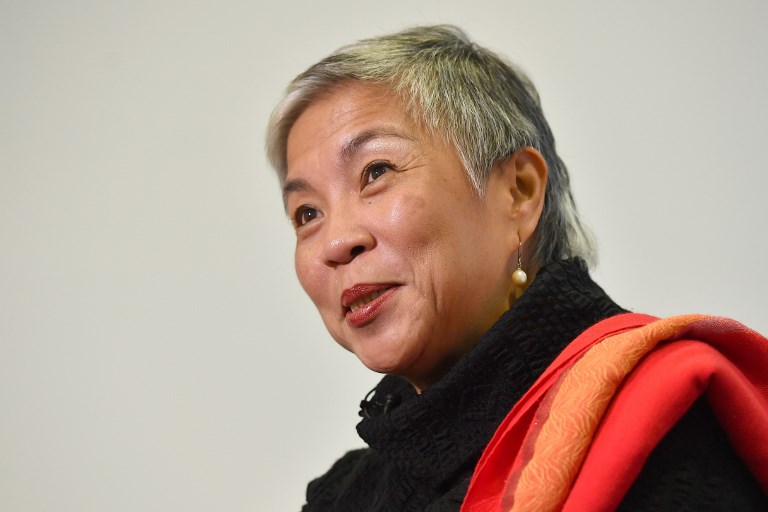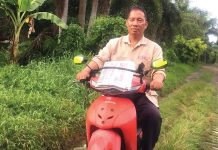
WINNING the prestigious Prize for Independence from the Reporters Sans Frontières (RSF, or Reporters Without Borders) during the 2018 Press Freedom Awards in London last year, journo Inday Espina-Varona – who traces her roots to Bacolod and Iloilo cities – dedicated her triumph to her fellow embattled Filipino journalists.
“This is for colleagues who face death threats, vilification campaigns, and revocation of access to coverage, for doing what journalists are supposed to do – questioning official acts and claims, especially on issues of human rights and corruption,” the Manila-based writer said in her acceptance speech at the Getty Images Gallery.
“I share this with embattled Philippine colleagues – the 185 killed since the 1986 restoration of a fragile, perpetually threatened democracy, 12 of them in the first two years of President Rodrigo Duterte’s rule,” she continued.
Varona was a former national chairperson of the National Union of Journalists of the Philippines, a Marshall McLuhan and Stanford journalism fellow, and a Jaime V. Ongpin awardee.
She was also one of the movers of #BabaeAko, a social media campaign (in response to President Rodrigo Duterte’s misogynistic comments on women) recognized as among TIME magazine’s most influential online platforms.
Currently she is a contributing editor for ABS-CBN News and a writer for UCAN News. She previously held top editorial positions in The Manila Times and the Philippines Graphic magazine.
As Panay News champions that “truth matters” its 38th anniversary issue, Varona discusses the roles of the media, accountability for fake news, and her advice to budding journalists in an exclusive interview.
***
PN: Congratulations on winning the Reporters Without Borders’ Prize for Independence. What initiative or stories of yours do you believe led to your win? What are the kinds of stories that need to be told in this day and age?
Inday: I am not too sure how I got chosen. It’s not for a single article. It is an award for body of work. I’ve covered issues as varied as children sold for sex, abused women, the fall of the Moro Islamic Liberation Front camps, the links between human rights violations and the greed for natural resources, terror attacks and the roots of conflict, the travails of indigenous peoples, LGBTQ rights and presidential wrongdoings.
I would like to dedicate more time to “slow journalism” a more in-depth and literary style that could transport readers into different worlds.
PN: For you, what are the roles of a journalist today, especially under the government of President Rodrigo Duterte and the regime of “fake news”?

Inday: Journalists report – we gather information and vet to determine the what, who, where, when, how and why of events.
We should not be mere recorders of what news subjects say. While every news subject has the right to express views and perspectives on events, journalists have the duty to dig and see if these claims are accurate and report contradictions when they spot it.
In the digital age, lies spread so fast and easily. Duterte and his aides know this. That is why they just spout lie after lie after lie. Journalists should be careful of allowing liars a free pass. They should not use the race to break first as an excuse for turning back on the obligation to vet and provide context that can help the public understand events.
PN: What’s the best way to fight against fake news and what do you believe has led to its prevalence?
Inday: Disinformation seems so prevalent these days because social media platforms allow a mass of people to share information to a vast network at a very fast pace.
As recent news show in detail, the speed of the spread of lies is aided by bots (automated “characters”) and the purchase by the architects of disinformation of the services of digital storm troopers who command teams of unthinking multipliers.
PN: Do you believe there is a way to fully eradicate fake news?
Inday: I do not believe in legislation as a solution to this problem. Vice President Leni Robredo was wrong there. Any law against fake news will sooner or later be used against critics of government and dissident groups.
There is no shortcut. I’ve spent years training citizens to be journalists and young people are eager and quick to learn. But it is not enough to help people spot lies. Long term success against the problem rests on people’s ability to be truth-tellers. The more you use social media for accurate and fair reports, the easier it becomes to smell and root out lies.
PN: You’re also a champion of the responsible use of social media, how do you feel we can get accountability for the spread of fake news online? Filipinos are known to be an easily misled bunch online, how do you feel this can be remedied?
Inday: We can’t hold people accountable if, in the first place, we do not have the skills to spot lies and replace these with the truth. We can’t build this ability if, in the first place, we do not read or just limit our reading to the echo chamber of our social media timelines.
When we spot lies, we can report this; there are mechanisms for this. If friends and kin spread false information, let us call them out politely and present proof of the falsity and, more important, provide the right data and version of events.
PN: You have been open about receiving grave threats on social media due to your line of work, do you feel that the Philippines has become an unsafe space for journalists? Do you feel deterred after reading these comments or messages?
Inday: It has always been dangerous – from when I was a very young and green journalist under the Marcos regime, to former President Corazon Aquino’s time, Fidel Ramos, and Joseph Estrada. It was particularly dangerous in the time of GMA [Gloria Macapagal-Arroyo]; I also got attacks from the AFP [Armed Forces of the Philippines] under President Benigno Aquino III.
But Duterte is in a class of his own. He is the only Philippine president who provides justification for the killing of journalists. He is also a habitual liar who slanders journalists and groups he cannot control.
Duterte attacks media from all directions. Aside from his lies – amplified by the troll army – he has used the entire bureaucracy to try to hamper the operations of critical media, especially Rappler.
PN: What drives you to keep writing hard-hitting columns and eye-opening stories despite the adversity?
Inday: We cannot cede the space to the architects of lies. There can be no accountability in silence.
PN: What are some of the most important lessons you’ve learned being a media practitioner for decades now? What are some of these lessons or advice you’d want to impart and pass on to the next generation of young journalists?
Inday: The more passionate you are about the cause, the stricter you should be on yourself. The greatest gift you can give to a cause or advocacy is coming out with a story so well reported and analyzed that even people on the other side grudgingly begin to acknowledge what they’ve tried hard to find.
PN: If there is a budding Filipino writer out there thinking of going into journalism, but hesitating due to fear, what would you want to say to him or her?
Inday: We want you. We need you. We cannot let fear be a determining factor. Join us. Let us work together.
PN: What’s in the near future for Inday Espina Varona?
Inday: More stories and commentaries. More advocacies./PN



